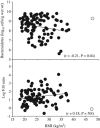Adiposity, gut microbiota and faecal short chain fatty acids are linked in adult humans
- PMID: 24979150
- PMCID: PMC4079931
- DOI: 10.1038/nutd.2014.23
Adiposity, gut microbiota and faecal short chain fatty acids are linked in adult humans
Abstract
Background/objectives: High dietary fibre intakes may protect against obesity by influencing colonic fermentation and the colonic microbiota. Though, recent studies suggest that increased colonic fermentation contributes to adiposity. Diet influences the composition of the gut microbiota. Previous research has not evaluated dietary intakes, body mass index (BMI), faecal microbiota and short chain fatty acid (SCFA) in the same cohort. Our objectives were to compare dietary intakes, faecal SCFA concentrations and gut microbial profiles in healthy lean (LN, BMI⩽25) and overweight or obese (OWOB, BMI>25) participants.
Design: We collected demographic information, 3-day diet records, physical activity questionnaires and breath and faecal samples from 94 participants of whom 52 were LN and 42 OWOB.
Results: Dietary intakes and physical activity levels did not differ significantly between groups. OWOB participants had higher faecal acetate (P=0.05), propionate (P=0.03), butyrate (P=0.05), valerate (P=0.03) and total short chain fatty acid (SCFA; P=0.02) concentrations than LN. No significant differences in Firmicutes to Bacteroides/Prevotella (F:B) ratio was observed between groups. However, in the entire cohort, Bacteroides/Prevotella counts were negatively correlated with faecal total SCFA (r=-0.32, P=0.002) and F:B ratio was positively correlated with faecal total SCFA (r=0.42, P<0.0001). Principal component analysis identified distinct gut microbiota and SCFA-F:B ratio components, which together accounted for 59% of the variation. F:B ratio loaded with the SCFA and not with the microbiota suggesting that SCFA and F:B ratio vary together and may be interrelated.
Conclusions: The results support the hypothesis that colonic fermentation patterns may be altered, leading to different faecal SCFA concentrations in OWOB compared with LN humans. More in-depth studies looking at the metabolic fate of SCFA produced in LN and OWOB participants are needed in order to determine the role of SCFA in obesity.
Figures


References
-
- Macfarlane GT, Cummings JH.The colonic flora, fermentation and large bowel digestive functionIn: Phillips SF, Pemberton JH, Shorter RG, (eds).The Large Intestine: Physiology, Pathophysiology and Disease Raven Press Ltd: New York, NY, USA; 199151–92.
-
- Cummings JH. Fermentation in the human large intestine: evidence and implications for health. Lancet. 1983;1:1206–1209. - PubMed
-
- Smith CJ, Bryant MP. Introduction to metabolic activities of intestinal bacteria. Am J Clin Nutr. 1979;32:149–157. - PubMed
-
- Topping DL, Clifton PM. Short-chain fatty acids and human colonic function:roles of resistant starch and nonstarch polysaccharides. Physiol Rev. 2001;81:1031–1064. - PubMed
LinkOut - more resources
Full Text Sources
Other Literature Sources
Medical

